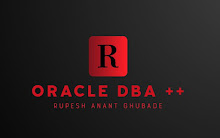Source DB Server:
OS: OEL 7.5
Database
Name: CLONE
DB Version:
11.2.0.4
Schema:
RUPESH
TABLE: EMP
Tablespace:
TEST
Target DB Server:
OS: OEL 7.5
Database
Name: ORCL
Pluggable DB Name: ORCLPDB
DB Version:
12.2.0.1
Schema:
C##RUPESH => Local User
Tablespace:
USERS
Step 1: Check current versions of both source and target DBs.
Source:
[oracle@clone
oracle]$ sqlplus / as sysdba
SQL*Plus:
Release 11.2.0.4.0 Production on Sun Jun 10 19:47:17 2018
Copyright
(c) 1982, 2013, Oracle. All rights
reserved.
Connected
to:
Oracle
Database 11g Enterprise Edition Release 11.2.0.4.0 - 64bit Production
With the
Partitioning, OLAP, Data Mining and Real Application Testing options
SQL>
select banner from v$version;
BANNER
--------------------------------------------------------------------------------
Oracle
Database 11g Enterprise Edition Release 11.2.0.4.0 - 64bit Production
PL/SQL
Release 11.2.0.4.0 - Production
CORE 11.2.0.4.0 Production
TNS for
Linux: Version 11.2.0.4.0 - Production
NLSRTL
Version 11.2.0.4.0 - Production
Target:
[oracle@test
oracle]$ sqlplus / as sysdba
SQL*Plus:
Release 12.2.0.1.0 Production on Sun Jun 10 19:47:43 2018
Copyright
(c) 1982, 2016, Oracle. All rights
reserved.
Connected
to:
Oracle
Database 12c Enterprise Edition Release 12.2.0.1.0 - 64bit Production
SQL>
select banner from v$version;
BANNER
--------------------------------------------------------------------------------
Oracle
Database 12c Enterprise Edition Release 12.2.0.1.0 - 64bit Production
PL/SQL
Release 12.2.0.1.0 - Production
CORE 12.2.0.1.0 Production
TNS for
Linux: Version 12.2.0.1.0 - Production
NLSRTL
Version 12.2.0.1.0 - Production
You can check whether pluggable feature is enabled or not using below command.
SQL> show pdbs
CON_ID CON_NAME OPEN MODE RESTRICTED
------ ------------- ---------- ----------
2 PDB$SEED READ ONLY NO
3 ORCLPDB READ WRITE NO
SQL> set
lines 300 pages 3000
SQL> col
directory_name for a13
SQL> col
directory_path for a34
SQL> col
owner for a13
SQL>
select * from dba_directories where directory_name='DIR';
OWNER
DIRECTORY_NAM DIRECTORY_PATH
-------------
------------- ----------------------------------
SYS
DIR /u01/app/oracle/
SQL> select username,account_status,default_tablespace from dba_users where username='RUPESH';
USERNAME ACCOUNT_STATUS DEFAULT_TABLESPACE
---------- ---------------- -------------------
RUPESH OPEN TEST
SQL>
conn rupesh
Enter
password:
Connected.
SQL>
SQL> select * from tab;
TNAME TABTYPE CLUSTERID
--------- ------- ----------
EMP TABLE
SQL>
select * from emp;
ID NAME
----------
------------
1 Tom
1 Tom
1 Tom
1 Tom
1 Tom
1 Tom
1 Tom
7 rows
selected.
[oracle@clone
oracle]$ expdp directory=DIR dumpfile=expdp_emp.dmp logfile=expdp_emp.log
tables=rupesh.emp
Export:
Release 11.2.0.4.0 - Production on Sun Jun 10 20:00:01 2018
Copyright
(c) 1982, 2011, Oracle and/or its affiliates.
All rights reserved.
Username: /
as sysdba
Connected
to: Oracle Database 11g Enterprise Edition Release 11.2.0.4.0 - 64bit
Production
With the
Partitioning, OLAP, Data Mining and Real Application Testing options
Starting
"SYS"."SYS_EXPORT_TABLE_01": /******** AS SYSDBA directory=DIR dumpfile=expdp_emp.dmp
logfile=expdp_emp.log tables=rupesh.emp
Estimate in
progress using BLOCKS method...
Processing
object type TABLE_EXPORT/TABLE/TABLE_DATA
Total
estimation using BLOCKS method: 64 KB
Processing
object type TABLE_EXPORT/TABLE/TABLE
. . exported
"RUPESH"."EMP" 5.476 KB 7 rows
Master
table "SYS"."SYS_EXPORT_TABLE_01" successfully
loaded/unloaded
******************************************************************************
Dump file
set for SYS.SYS_EXPORT_TABLE_01 is:
/u01/app/oracle/expdp_emp.dmp
Job
"SYS"."SYS_EXPORT_TABLE_01" successfully completed at Sun
Jun 10 20:00:12 2018 elapsed 0 00:00:06
[oracle@clone
oracle]$ pwd
/u01/app/oracle
[oracle@clone
oracle]$ ls -ltr expdp*
-rw-r-----
1 oracle oinstall 94208 Jun 10 20:00 expdp_emp.dmp
-rw-r--r--
1 oracle oinstall 1060 Jun 10 20:00
expdp_emp.log
Copy exported table on target DB server.
[oracle@clone
oracle]$ scp expdp_emp.dmp oracle@test:/u01/app/oracle
oracle@test's
password:
expdp_emp.dmp
100% 92KB 20.7MB/s
00:00
Step 4: Check user metadata on target DB server.
SQL>
select username,account_status,default_tablespace from dba_users where
username='C##RUPESH';
USERNAME ACCOUNT_STATUS DEFAULT_TABLESPACE
----------- --------------- -------------------
C##RUPESH OPEN USERS
SQL>
conn C##RUPESH
Enter
password:
Connected.
SQL> select
* from tab;
TNAME TABTYPE CLUSTERID
-------- ----------- ---------------
DEPT TABLE
[oracle@test
admin]$ cat tnsnames.ora | grep -10 ORCLPDB
ORCLPDB =
(DESCRIPTION
=
(ADDRESS = (PROTOCOL = TCP)(HOST =
test.localdomain)(PORT = 1521))
(CONNECT_DATA =
(SERVER = DEDICATED)
(SERVICE_NAME = orcl.localdomain)
)
)
Step 5: Start import on target DB server.
[oracle@test
oracle]$ impdp directory=DIR dumpfile=expdp_emp.dmp logfile=impdp_emp.log
tables=rupesh.emp remap_schema=rupesh:C##RUPESH remap_tablespace=TEST:USERS
Import:
Release 12.2.0.1.0 - Production on Sun Jun 10 20:03:24 2018
Copyright
(c) 1982, 2017, Oracle and/or its affiliates.
All rights reserved.
Username:
system@ORCLPDB
Password:
Connected
to: Oracle Database 12c Enterprise Edition Release 12.2.0.1.0 - 64bit
Production
Warning:
Oracle Data Pump operations are not typically needed when connected to the root
or seed of a container database.
Master
table "SYSTEM"."SYS_IMPORT_TABLE_01" successfully
loaded/unloaded
import done
in AL32UTF8 character set and AL16UTF16 NCHAR character set
export done
in WE8MSWIN1252 character set and AL16UTF16 NCHAR character set
Warning:
possible data loss in character set conversions
Starting
"SYSTEM"."SYS_IMPORT_TABLE_01": system/********@ORCLPDB directory=DIR
dumpfile=expdp_emp.dmp logfile=impdp_emp.log tables=rupesh.emp
remap_schema=rupesh:C##RUPESH remap_tablespace=TEST:USERS
Processing
object type TABLE_EXPORT/TABLE/TABLE
Processing
object type TABLE_EXPORT/TABLE/TABLE_DATA
. .
imported "C##RUPESH"."EMP" 5.476 KB 7 rows
Job
"SYSTEM"."SYS_IMPORT_TABLE_01" successfully completed at
Sun Jun 10 20:03:43 2018 elapsed 0 00:00:08
SQL>
conn C##RUPESH
Enter
password:
Connected.
SQL>
select * from tab;
TNAME TABTYPE CLUSTERID
----- --------- -----------
DEPT TABLE
EMP TABLE
SQL>
select * from emp;
ID NAME
----------
------------
1 Tom
1 Tom
1 Tom
1 Tom
1 Tom
1 Tom
1 Tom
7 rows
selected.
Thanks for reading this post ! Please comment if you like this post !




Very nice article and good explanation
ReplyDeleteOracle SOA Online Training
Acompciscur_ka-2001 Brandi Sampy https://marketplace.visualstudio.com/items?itemName=1subscinviya.Witch-Slide-gratuita
ReplyDeleteinavifchar